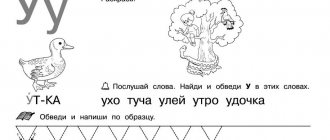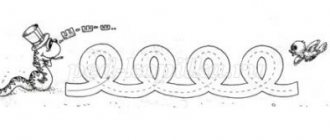Contents of work in a speech therapy group
The language of the teacher plays an important role in everyday communication with children in the speech therapy group. She should serve as a role model for children with speech impairments: She should be clear, well-articulated, well-toned, figuratively expressive and grammatically correct. Complex inverse constructions, figures of speech, and introductory words that make it difficult to understand the language should be avoided. Prominent teachers and methodologists for speech development in preschoolers E.I. Tikheeva and E.A. Flerina drew attention to this.
A feature of a teacher’s work in a speech therapy group is that the teacher organizes and carries out activities on the instructions of the teacher/speech therapist. Individual or subgroup lessons with children are planned in the afternoon after nap time (before or after sleep). 5-7 children are invited to an evening speech therapy session.
The following types of exercises are recommended:
- Consolidating familiar sounds (pronunciation of syllables, words, sentences);
- Repetition of poems and stories;
- Exercises for the development of attention, memory, logical thinking, phonemic hearing, sound analysis and synthesis skills;
- Stimulation of coherent speech in conversations on familiar lexical or everyday topics.
As part of correctional work, the tutor pays great attention to the development of fine motor skills. During extracurricular hours, children can be asked, for example, to assemble a mosaic, make puzzles, make figures from matches or counting sticks, practice untying and tying shoelaces, collecting buttons or small objects, and using pencils of different sizes. Children can be encouraged to use handwriting worksheets recommended for children with language impairments.
Particular attention in the work of the teacher is paid to organizing outdoor games for children with speech impairments, since these children are often somatically weakened, physically tense, and get tired quickly. When planning work on organizing gaming activities, the teacher must clearly understand the reality of the physical capabilities of each child and take a differentiated approach to the choice of games. Outdoor games, which are usually part of physical education, can be played during a walk, at holiday parties, or during an hour of entertainment.
Games with movement should be combined with other types of children's activities. At the same time, outdoor games contribute to the successful formation of language. They often contain choruses, quatrains, and may be preceded by a game of counting to choose a leader. Such games also develop a sense of rhythm, harmony and coordination of movements, and have a positive effect on the mental state of children.
The work of a teacher with children in role-playing games is also a necessary element of pedagogical activity in a speech therapy group. In role-playing games, the teacher activates and enriches vocabulary, develops coherent speech, and teaches ritual interaction in social situations familiar to the child (visiting a doctor, shopping at a store, transport, etc.). Role-playing games promote the development of communication and speech skills, stimulate children's sociability and promote the development of social skills and abilities.
Specifics of the work of a teacher in a speech therapy group
Compensation for a child’s speech defect, his social adaptation and preparation for a further school career require mastering, under the guidance of a tutor, those types of activities that are provided for in the programs of a mass general kindergarten. The teacher should pay special attention to the development of perception (visual, auditory and tactile), mnemonic processes, accessible forms of visual-figurative and verbal-logical thinking and motivation.
An important aspect of work in a speech therapy group is the development of cognitive activity and cognitive interests of children. It is necessary to take into account the peculiar delay in the formation of cognitive processes in general, which is formed in children under the influence of underdevelopment of speech, narrowing of contacts with others, inadequate methods of family education and other reasons.
Correct, pedagogically sound interaction between a teacher and a speech therapist, who combine their efforts in the interests of correcting children’s speech, is based on creating a friendly, emotionally positive environment in a speech therapy group. The psychological atmosphere in the children's team strengthens children's self-confidence, helps smooth out negative feelings associated with speech impairment, and creates interest in learning. To do this, the educator, like the speech therapist, must have knowledge in the field of developmental psychology and individual psychophysical differences in preschool children. They must be able to understand various negative manifestations of children’s behavior and promptly notice signs of fatigue, exhaustion, passivity and lethargy. Properly organized psychological and pedagogical influence of the teacher in most cases prevents the occurrence of persistent unwanted deviations in behavior and creates a team of friendly, socially acceptable relationships in the speech therapy group.
The work of a teacher on speech development in many cases precedes speech therapy training, prepares children to perceive material in future speech therapy classes, creating the necessary cognitive and motivational basis for the formation of speech knowledge and skills. In other cases, the teacher concentrates on consolidating the results achieved by children in speech therapy classes.
The task of the teacher of the speech therapy group also includes daily monitoring of the state of children’s speech activity during each period of the correction process, checking the correct use of sounds assigned or corrected by the speech therapist, acquired grammatical forms, etc. The teacher should pay special attention to children with a late onset of speech activity, with a complex medical history and psychophysiological immaturity. The teacher should not focus children's attention on the appearance of possible errors or stuttering in speech, repetition of the first syllables and words. Such manifestations should be reported to a speech therapist. The teacher’s responsibilities also include good knowledge of the individual characteristics of children with general speech underdevelopment, who react differently to their defect, to difficulties in communication, to changes in communication conditions.
Interaction between teacher and speech therapist
The implementation of the entire complex of correctional training in speech therapy requires a combination of special training for the correction of speech deficiencies with general program requirements. A special daily routine has been developed for speech therapy groups, which differs from the usual. The speech therapist conducts frontal, partly group and individual classes. In addition, the schedule provides time for classes according to a comprehensive program for preschool children (“Development”, “Rainbow”, “Childhood”, etc.): mathematics, speech development and familiarization with the outside world, ecology, drawing, modeling, sports and music classes. In addition, in the evening, the teacher works with subgroups or individual children on speech correction (development) in accordance with the instructions of the speech therapist. The tutor plans his work taking into account the requirements of both the standard general program and the speech abilities of the children and their progress in overcoming the correction program conducted by the speech therapist, in accordance with the nature of the speech disorder.
In this regard, it is necessary to ensure interaction and continuity in the work of the teacher and speech therapist in the speech therapy group. The teacher must know the main directions of the auxiliary program, the age and individual characteristics of the language education of preschoolers, understand the pronunciation features and lexical and grammatical aspects of the language, take into account the language abilities of each child in school and extracurricular activities.
Together with the speech therapist, the teacher plans activities for speech development, familiarization with the outside world, learning to read and preparing hands for writing. Continuity in the work of a speech therapist and teacher means not only joint planning, but also the exchange of information, discussion of the results of children’s work, both in speech and in other types of activities. All this is recorded in a special notebook.
Thus, the teacher of the speech therapy group carries out a pedagogical and complex of corrective measures, the essence of which is to eliminate deficiencies in the sensory, affective-volitional, and intellectual spheres caused by the characteristics of the speech defect. At the same time, the teacher pays attention not only to correcting existing defects in the child’s development, enriching ideas about the environment, but also to further developing and improving the activities of safe analyzers. This creates the basis for the favorable development of the child’s compensatory capabilities, which ultimately affects effective language acquisition.




